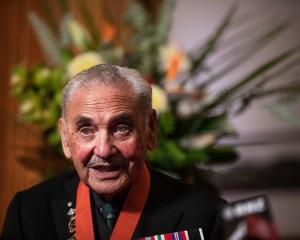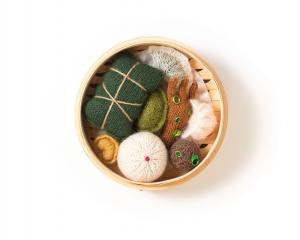
Valentine's Day might celebrate romance, but what exactly is intimacy, asks Shane Gilchrist.
As Valentine's Day is upon us again, bringing with it the prospect of bouquets, romantic brunches or, perhaps, breakfast in bed, there comes more than a whiff of irony for one Dunedin florist.
Jolene Wilkinson, owner of Estelle Flowers, admits it's a rare treat for her partner to receive any blooms on Valentine's Day.
‘‘There's just no time to think of him and still get all those orders out,'' she explains from her shop on Moray Pl, outside which petals add a delicate spray of colour to the asphalt pavement.
‘‘I have a window of about an hour post-shop chaos to personally celebrate Valentine's before the lack of sleep and workload exhaustion catches up on me, just enough time for some Champagne and pasta at Etrusco.''
Still, she's not complaining. And should her partner get her flowers, well, that would be just fine.
Somewhat surprisingly, given the nature of her business, Miss Wilkinson says she doesn't particularly enjoy ‘‘all the marketing'' of Valentine's Day.
‘‘But if you take that away, it's a simple gesture. I do love the romance and symbolism of the day.‘‘Extravagance is cool, too. For instance, I have a single order for 100 red roses.''
Such extravagance is not unusual. Figures released by electronic transaction company Paymark show spending at florists increased 154.4% in the week before Valentine's Day last year, with more than $3 million spent at florists around the country. Other spending spikes included increases in jewellery and book sales, up 42% and 25% respectively, compared to the previous week.
According to a 2014 Colmar Brunton survey, New Zealand women are more likely than men to get the Valentine's Day gift they want, although more than a third might not get anything at all.
The survey of 1000 people revealed 41% of respondents wouldn't spend a cent on Valentine's Day. However, of those planning to celebrate, many preferred to mark the occasion with food, be it a romantic restaurant dinner (23%), a casual meal out (19%) or a homemade dinner (14%).
Top date locations included the beach (17%), followed by Queenstown, the Bay of Islands, and various parks, forests or mountains. A night in could be just as romantic, though, with a quarter of respondents saying they got engaged at home.
However, Dunedin therapist Jeannie Horn is wary of all this amorous aggregation.
Mrs Horn, whose range of counselling techniques includes delving into relationship issues (from next month she will offer therapy for couples) believes expressions of love shouldn't be shoehorned into one day a year.‘‘We have to do things for each other - without being asked - every day. It's important to feed a relationship, to keep alive the energy.‘‘Intimacy is a process. It is fluid and can take many forms,'' Mrs Horn says.
In that, she touches on an important notion: how do we define intimacy? Is it solely physical contact? A deeper ‘‘spiritual'' connection? Mutual respect? Friendship?
‘‘Sexual intimacy is the stereotypical definition of intimacy but, actually, other forms of intimacy often create the conditions for sexual intimacy.
"Intimacy has to be based on trust. If we can't trust the other person, we aren't able to be authentic with them and take the risk of revealing our true selves. Only then can we be truly intimate,'' Mrs Horn says.
‘‘People also need to trust themselves, to know who they are before they go into a relationship. When I work with somebody who is having trouble in a relationship, I will ask them what they are responsible for, as well as what they think the other person is responsible for. It's a 50-50 thing. You have to take responsibility for yourself. Actually, I prefer to phrase that as two words: your self.''
Forms of intimacy might be broken down into the following key categories:
• Cognitive (intellectual) intimacy, where two people exchange thoughts, share ideas and enjoy similarities and differences between their opinions
• Experiential intimacy, where people share experiences, being actively involved with each other
• Emotional intimacy, where people share their feelings with each other or empathise with the other person
• Sexual intimacy, which includes a range of sensuous activity
It is also important to recognise that every relationship does not necessarily have to include all the different aspects of intimacy mentioned.
For instance, a satisfying intimate relationship might exist despite an absence of one (or more) of those factors, or it might navigate a combination of those areas, some of which might be disproportionate to others.
‘‘I've been married for more than 30 years and my husband and I have developed a level of communication where we don't even have to speak to each other,'' Mrs Horn says.
‘‘That, to me, is intimacy. We are so in tune cognitively that we know what the other is thinking. It's that level of connection to another person. Communication is all important.''
Although she admits it can take time to develop such levels of connection, Mrs Horn also describes herself as something of ‘‘an old romantic'', one who believes deep intimacy can sometimes be achieved in a relatively short span.
‘‘When people know they've met the right person ... sometimes time isn't important in regards intimacy. A couple who've only been together for a few weeks might have a greater level of real intimacy than a couple who have been together many years.''
Chris Brickell, of the University of Otago department of sociology, gender and social work, points to a couple of key reasons why the notion of intimacy is often intertwined with sex.
‘‘In terms of scholarship, friendship hasn't received anything like the attention afforded romantic attachment or sexual relationships. There is a sense that relationships that are not sexually based are not worthy of study or consideration.
"Also, quite a lot of research into sexuality in the past 30 years has been funded by sexual health agencies. Thus it focuses on sexual practices rather than on intimacy more broadly. I think research funding priorities have led partly to this.''
Therefore any subsequent attention (e.g. media coverage) of a medical breakthrough in regards sexual health reinforces one end of the continuum of intimacy, the gender studies co-ordinator notes.
Assoc Prof Brickell, whose 2008 book Mates and Lovers: A History of Gay New Zealand won a Montana Award and was made into a stage play, says Valentine's Day marketing probably doesn't help a fuller exploration of intimacy.
‘‘Researching male friendships has been quite interesting, in that it raises the question of intimacy. Is it just sex? Or is about a whole range of connections? And what if you take sex out of the picture? Are there other notions of intimacy - say, a really strong friendship between two men - that aren't that much different than the deep friendship between a male and female partner?
‘‘You could say Valentine's Day marketing has become exclusive of non-conventional relationships, but as same-sex marriage becomes normalised, gay and lesbian couples are thus drawn into the orbit of that traditional imagery.
‘‘If you think of the increased mainstreaming of same-sex marriages, the prevailing image is fairly traditional, in that it involves a couple. It's not that different from heterosexual marriage. Thus it's possible we will get a Valentine's industry that ends up incorporating same-sex monogamous imagery.
‘‘And there is nothing marketeers like more than another target market.''












